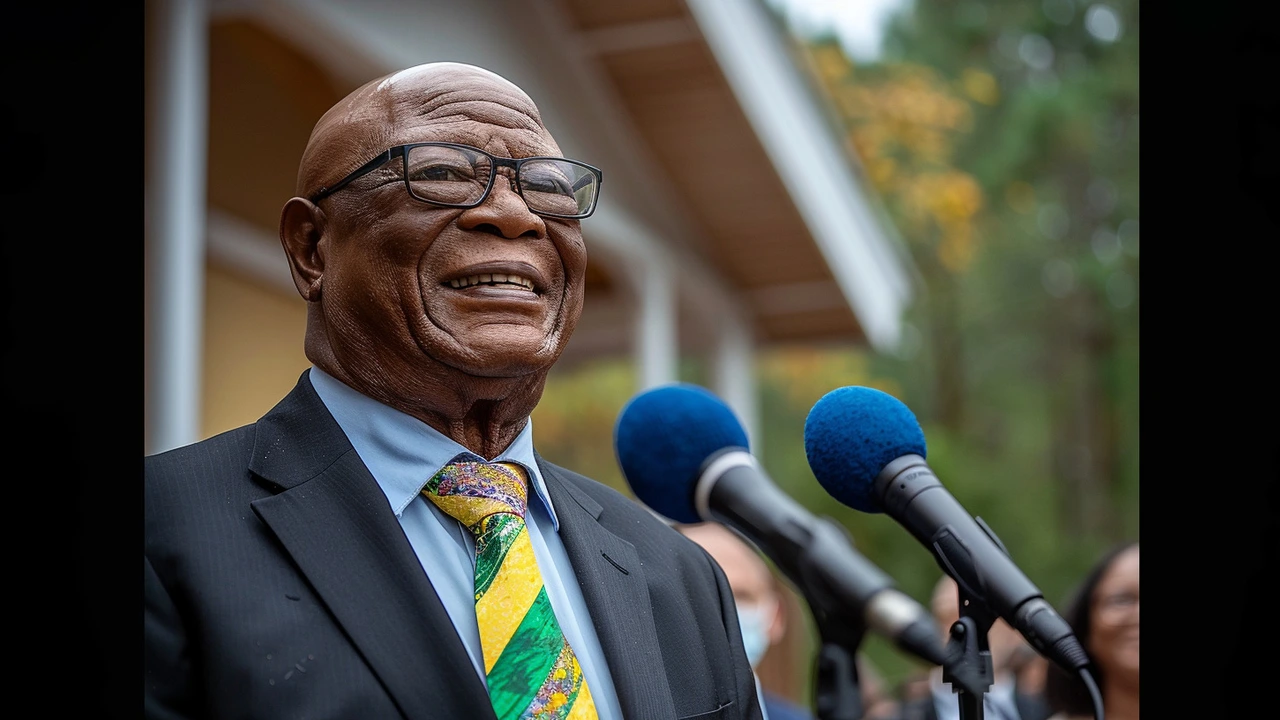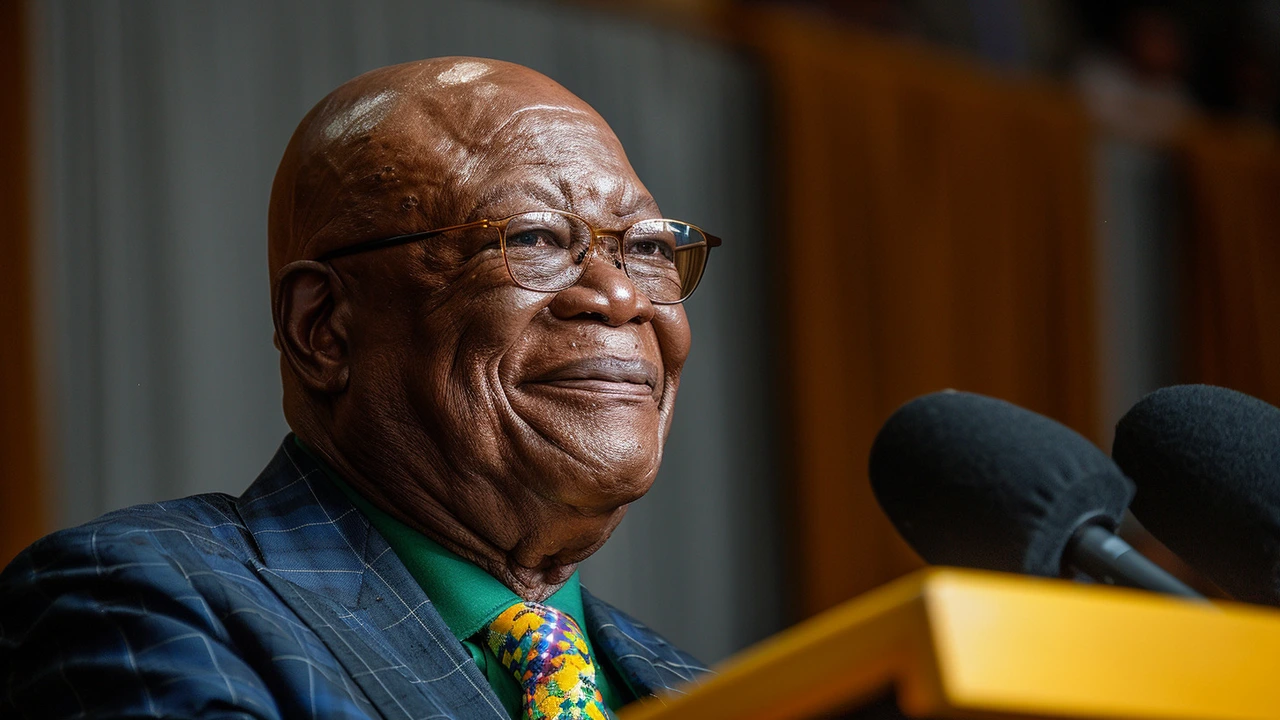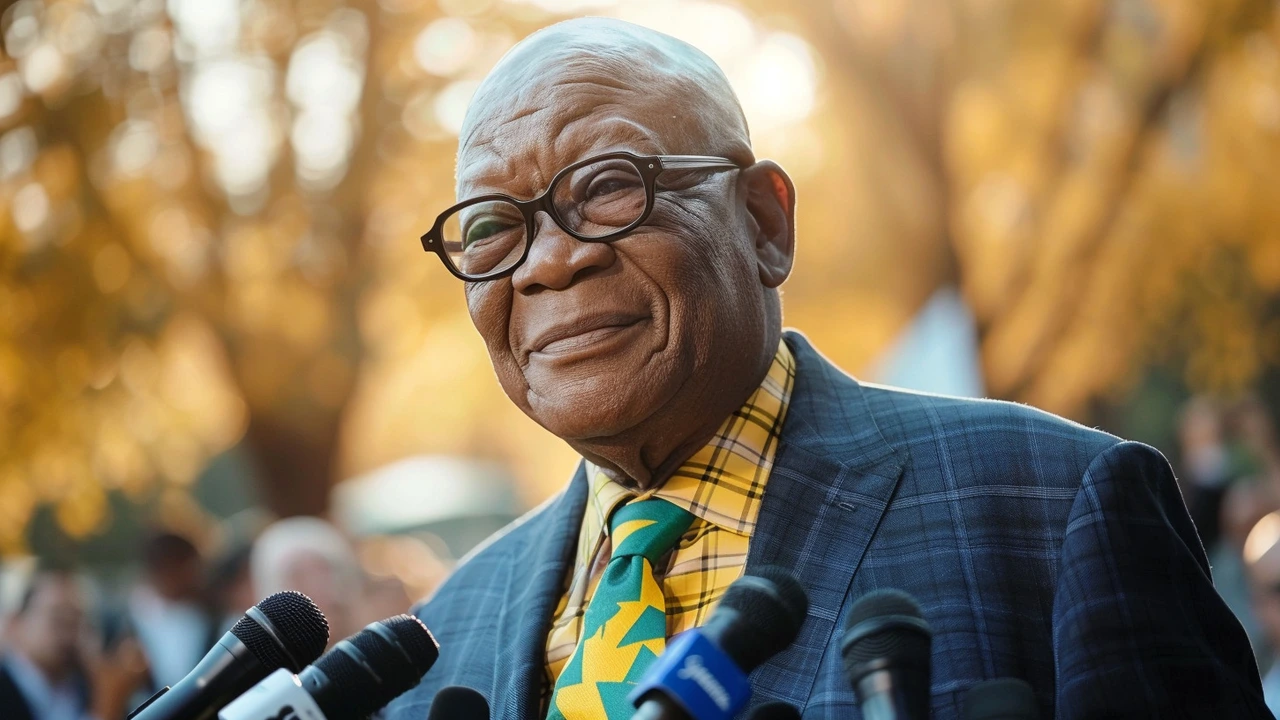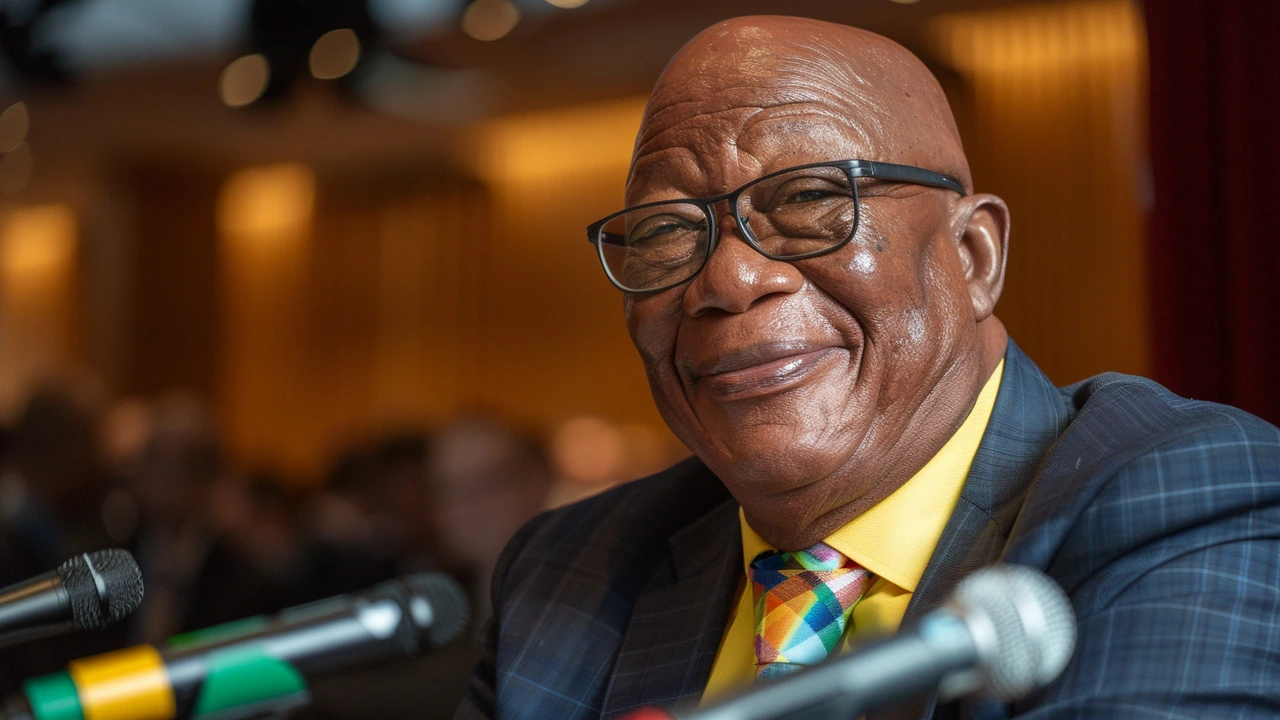Former South African President Zuma's Party Joins EFF in Opposition Mega Alliance
In a significant political shift, former South African President Jacob Zuma's party, uMkhonto weSizwe (MK), has entered into a coalition with the radical Economic Freedom Fighters (EFF), forming a formidable opposition alliance in the South African Parliament. The new grouping, known as the ‘Progressive Caucus,’ brings together several predominantly left-leaning opposition parties, aiming to challenge the ruling party's hold on power.
The coalition emerged following the contentious 2024 elections, which Zuma’s party claims were compromised by rigging. This alliance marks a new chapter in South African politics as the MK party, alongside EFF and other opposition factions, seeks to unsettle the established political order. The stakes are high, with legal battles and parliamentary strategies set to dominate the political landscape in the coming months.

Allegations of Election Rigging and Legal Battles
uMkhonto weSizwe (MK) vehemently denounced the outcome of the 2024 elections, where they secured 14.6% of the vote, translating to 58 seats in parliament. Nhlamulo Ndhlela, the spokesperson for the MK party, announced their intent to pursue legal action both within South Africa and on international stages to contest the election results. According to Ndhlela, the party's decision to challenge the election results was driven by what they perceive as widespread irregularities that tainted the democratic process.
The initial reaction from MK was to boycott the first parliamentary assembly session, where Cyril Ramaphosa, President of the African National Congress (ANC), was re-elected for a second term. Ramaphosa’s administration, however, did not go unchallenged, as MK later decided to partake in the National Assembly, signalling their ongoing commitment to legislative engagement while simultaneously pursuing legal avenues.
The Formation and Future of the Progressive Caucus
Led by the EFF, the Progressive Caucus is an amalgamation of various opposition parties with a shared vision of instituting substantive change in South Africa’s political landscape. This coalition includes not only MK and EFF but multiple smaller leftist groups that share a common goal of addressing socio-economic disparities and government accountability. The alliance believes that their collective voice will hold greater power and influence in parliamentary proceedings.
By bringing together diverse political ideologies under a single banner, the Progressive Caucus seeks to create a robust counterbalance to the dominant ANC-led government. The formation of this group is as much a reaction to the allegations of election fraud as it is a statement on the need for greater political diversity and representation. This alliance is expected to amplify its efforts in galvanizing public support and driving legislative initiatives that challenge the status quo.

Ramaphosa’s Government of National Unity and Its Challenges
Cyril Ramaphosa, re-elected amidst a backdrop of controversy and legal disputes, faces the formidable task of leading a government of national unity. This approach attempts to bring together different political factions under a common government to ensure stability and national progress. However, the formation of the Progressive Caucus presents a significant challenge to Ramaphosa’s administration.
Ramaphosa's long-standing rivalry with Jacob Zuma adds another layer of complexity to South Africa's political dynamics. Zuma, who was removed from office by the ANC in 2018 due to corruption allegations, remains a polarizing figure in South African politics. His party's coalition with the EFF brings together two influential leaders with substantial followings, united by a common opposition to Ramaphosa’s leadership and the ANC’s policies.
Public and International Reactions
The public reaction in South Africa has been mixed, with staunch supporters of both MK and EFF welcoming the coalition as a necessary step towards political reform. Meanwhile, critics fear that the alliance may further polarize the country and complicate efforts for national unity. The international community is watching keenly as the political developments unfold, with ramifications for South Africa’s standing on the global stage.
The allegations of election rigging have also drawn the attention of global electoral watchdogs and human rights organizations, which are calling for transparent investigations to uphold the integrity of South Africa’s democratic processes. The Progressive Caucus aims to leverage this international scrutiny to bolster their legal challenges and validate their claims of electoral fraud.

The Road Ahead for South African Politics
Looking forward, South Africa's political environment is set to be highly dynamic, with the Progressive Caucus aiming to redefine the country's political discourse. The alliance's strategies will likely focus on legislative advocacy, public mobilization, and sustained legal battles to contest the 2024 election results. This period promises to be one of intense political activity, with both sides preparing for a protracted struggle for dominance.
The Progressive Caucus is poised to play a critical role in shaping the legislative agenda, utilizing their combined parliamentary strength to propose and block bills as they see fit. Their influence will extend beyond parliament as they engage with civil society, media, and international stakeholders to build a broad-based support network.
Conclusion
In the coming months, the effectiveness of the Progressive Caucus in altering the political landscape will be tested. Their ability to maintain unity among diverse political entities and persuade the public of their vision for South Africa will be crucial. As the electorate and international observers watch with anticipation, South Africa gears up for a transformative phase in its political history.

Traci Walther
June 18, 2024 AT 01:23Wow!!! 🎉 This alliance is like a fireworks show of South African politics!! 🎆 The MK‑EFF combo could really shake the ANC’s throne 😂💥 It’s a bold move that might rally disillusioned voters and put real pressure on the ruling party!!! Let’s watch how the legal battles unfold – the drama is just getting started!!!
Ricardo Smalley
June 18, 2024 AT 01:40Oh, great, another coalition to ‘save the day’ – because history has shown that more parties teaming up automatically fixes everything. The Progressive Caucus will surely turn South Africa into a utopia where every policy is vetted by a committee of radical idealists. Meanwhile, the ANC just keeps humming along, probably sipping tea and ignoring the chaos. If only the electorate could enjoy this theatrical spectacle without any real consequences. Sarcasm aside, the real test will be in how they handle actual governance.
Sarah Lunn
June 18, 2024 AT 01:56This is absolute theatre! The drama of Zuma’s party hopping onto the EFF bandwagon is a masterclass in political melodrama. If anyone can misplace a comma in a legal brief, it’s definitely the coalition’s press releases.
Gary Henderson
June 18, 2024 AT 02:13Looks like the opposition finally decided to play in the same sandbox. Curious to see if they can actually pull off any meaningful legislation together.
Julius Brodkorb
June 18, 2024 AT 02:30To build on that point, the Progressive Caucus faces a steep hill when it comes to legislative effectiveness. Their combined seat count might look impressive on paper, but the real power lies in coalition discipline, which is notoriously fragile in South African politics. Historically, left‑leaning factions have struggled to maintain a unified voting bloc, especially when ideological priorities diverge. Moreover, the legal challenges they plan to launch could divert resources away from policy formulation. If they spread themselves too thin, their parliamentary influence could wane faster than a summer storm. On the other hand, a coordinated front could pressure the ANC into concessions on key economic reforms. The alliance must prioritize clear communication channels to avoid internal disputes that could cripple their agenda. Engaging civil society groups will be crucial to legitimize their platform beyond the walls of parliament. International observers are already taking note, which might amplify their leverage if they present a cohesive narrative. However, any misstep could be seized upon by the ruling party to paint the coalition as unstable. In terms of strategy, they should consider forming sub‑committees focused on specific issues like land reform, corruption, and education. These sub‑committees can craft detailed proposals while the broader caucus maintains unity. Ultimately, the success of the Progressive Caucus will hinge on their ability to translate protest into policy, turning street rallies into legislative wins. Time will tell if they can rise above the noise and become a true counterweight to the ANC’s dominance.
Juliana Kamya
June 18, 2024 AT 02:46From a mentorship perspective, this coalition can serve as a catalyst for political empowerment across marginalized communities. By integrating grassroots activism with parliamentary tactics, they can bridge the gap between street-level demands and institutional change. The synergy between MK’s historic legacy and the EFF’s radical policy proposals could generate a new paradigm of inclusive governance.
Erica Hemhauser
June 18, 2024 AT 03:03The alliance is a misguided attempt at power‑grabbing.
Hailey Wengle
June 18, 2024 AT 03:20Wake up! This so‑called ‘Progressive Caucus’ is just a smokescreen for foreign interference!!! They’re planting votes, rigging outcomes, and using legal battles as a diversion!!! The ANC will crumble under their covert agenda, and the nation will be left to pick up the pieces!!!
Maxine Gaa
June 18, 2024 AT 03:36In pondering the broader philosophical implications, one might ask whether the emergence of such alliances signals a deeper yearning for collective agency. It reflects a societal pivot toward shared responsibility, moving beyond individualistic politics. This could be a turning point where the populace redefines democracy as a continuous dialogue rather than a static contest. The interplay of power, ideology, and communal aspiration is indeed fascinating.
Katie Osborne
June 18, 2024 AT 03:53From a formal standpoint, the formation of the Progressive Caucus warrants a thorough analysis of its compliance with electoral statutes and parliamentary procedures. It is imperative that the coalition adheres to constitutional mandates while pursuing its legislative agenda. Such scrutiny will ensure the integrity of the democratic process is maintained.